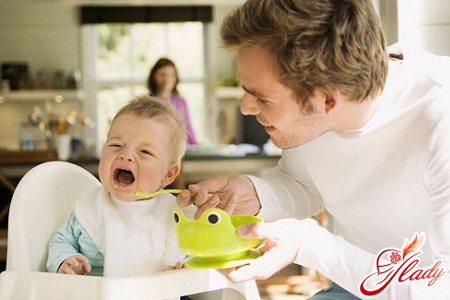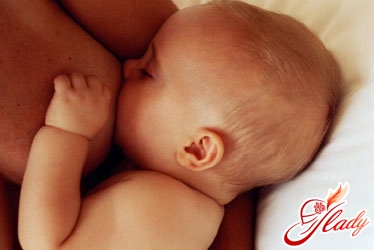 Despite the fact that in today's world the standardbeauty and attractiveness is considered harmony, if not more - leanness, all without exception, mom want to see their kids plump. And not only moms, and all the compassionate relatives try to feed the skinny baby, and each of the adults feeds the crumbs as he deems necessary for the child to gain weight. The main question in the family is "the child does not eat well, what should I do?". Many parents believe that for a normal development of a child, a large amount of food is needed, and by all the truths and crooks, and if the child is very poorly eating, they, despite the child's reluctance and protest, force him to eat everything that is put to him on the plate. And sometimes they put it as not a little, portions and an adult person would be enough with a head. As a result, the baby, sobbing and daring, is forced through force to eat the food offered to him. Such measures of coercion to food will not bring the desired result, but problems can create very, very much. So, for example, the sad result of forced feeding can be:
Despite the fact that in today's world the standardbeauty and attractiveness is considered harmony, if not more - leanness, all without exception, mom want to see their kids plump. And not only moms, and all the compassionate relatives try to feed the skinny baby, and each of the adults feeds the crumbs as he deems necessary for the child to gain weight. The main question in the family is "the child does not eat well, what should I do?". Many parents believe that for a normal development of a child, a large amount of food is needed, and by all the truths and crooks, and if the child is very poorly eating, they, despite the child's reluctance and protest, force him to eat everything that is put to him on the plate. And sometimes they put it as not a little, portions and an adult person would be enough with a head. As a result, the baby, sobbing and daring, is forced through force to eat the food offered to him. Such measures of coercion to food will not bring the desired result, but problems can create very, very much. So, for example, the sad result of forced feeding can be:
- Aversion to any food. If a child is forced to eat through strength, very soon he will develop a persistent subconscious reflex refreshing to food. Any attempt to feed a child will lead to uncontrolled attacks of vomiting. As a result, the child will eat even less than now - the circle will close, the problem of low weight will only worsen.
- Violation of the normal process of digestion. In the event that the body receives more food than it needs for normal functioning, the digestive system will inevitably overload. The consequence may be a violation of its normal functioning and, as a consequence, the occurrence of diarrhea and even dysbiosis.
- Excess body weight. The above is the most common result of the child's forcible feeding. Much rarer, but still sometimes there is such a complication, as an overweight child. The scheme of its occurrence before the banality is simple - an organism that constantly receives an excessive amount of food, at the end, adapts and rebuilds, resulting in a tendency for the child to become overweight. And being overweight will not bring your child anything but a sea of problems.
By the way, the problems will be the most diverse- starting from difficulties with health, ending with psychological problems. So is it worth it to satisfy your ambitions with your own hands to raise from your child an insecure and unsound person?
Is there a problem?
Before raising panic aboutinsufficient weight of your child, make sure that your child's shortage of body weight really exists. All pediatricians with enviable persistence face cases when frightened mothers turn to them with complaints that the child weighs little. But when the child is examined and weighed, it turns out that the baby, despite all the fears of the mother and the "horror stories" of the relatives, fully corresponds to the age norms. In addition, in addition to age standards, doctors take into account such an important aspect as harmonious physical development or, in other words, the correspondence of height and weight. But the parents of a very young child need to be very attentive and immediately react to the deterioration of the child's appetite. Unfortunately, as a rule, if the baby is not eating well, doctors discover serious health problems. For example, a lack of appetite in a newborn baby may indicate such a formidable complication as an intestinal obstruction. And if a 3 month old child does not eat well, you can suspect dysbacteriosis in your baby.
Thin baby
If your concerns were not in vain, and afterthe examination and evaluation of the physical parameters of your child the doctor will confirm the deficiency of body weight, it is necessary to find out the reason. It is also impossible for parents to do this themselves, so it's worth giving this exercise to pediatricians. Doctors distinguish two types of thinness:
- Healthy thinness. In this case, the increased slenderness of your crumbs is due only to a genetic predisposition to a small mass of the body. As a rule, either mom or dad, and sometimes both parents at once also can not boast of especially large sizes of clothes. There is an opinion that in such cases, with a low body weight, the growth of crumbs should also be small enough. However, this is pure water misconception - there are a lot of lean, but at the same time high people who have absolutely no health problems.
- Pathological thinness. In the event that the deficit of weight is caused not by the physiological characteristics of your child's organism and not by hereditary factors, but by any systemic diseases of vital organs, doctors speak about pathological thinness. In order to help the child gain the required body weight, one adjustment diet is not enough, the baby needs treatment of the underlying disease.
Many parents complain not only about the lowbody weight, and mainly on the poor appetite of the child, up to its complete absence. But everything is not so simple - it is difficult to answer unequivocally how to make a child eat. Absence or deterioration of appetite in children can be caused by a variety of factors:
- Recently suffered diseases.
What is the time of illness appetite in mostof cases disappears completely, any person periodically experiences himself. And children do not become an exception to this rule. So, for example, a banal acute respiratory disease or chickenpox can completely repel the child's appetite. As a result, a child during a period of illness can significantly lose weight. Parents should not be frightened of this phenomenon - after your child gets well and his appetite returns, he will very quickly return to his previous form. However, remember the need for a smooth and gradual return to the usual diet. This is necessary in order not to overload the child's digestive system.
- Psychological aspects.
If your child is very poorly eating, refuseseven from food previously beloved, but at the same time he did not have any health problems with his doctors, pay attention to the psychological state of the child. Causes for loss of appetite for a baby can be a variety of factors, such as problems in communicating with peers or caregivers in kindergarten, forcible feeding. All this keeps the child in constant nervous excitement, which can not but have a negative effect on his appetite. By the way, very often a child eats badly in the garden because of conflicts with educators. Another very common reason for the child's refusal to eat is banal childish jealousy, especially when a younger child appears in the family. In such cases, when the reason for refusing food is psychological factors, parents should consult a child psychologist who will tell how to cope with these problems and return the child a normal appetite.
- Hidden diseases.
In the event that the loss of appetite in a childaccompanied by increased lethargy, apathy, fast fatigue, parents should as soon as possible seek medical help. Such a child needs an immediate examination of the doctor and a number of diagnostic tests - a general analysis of blood and urine, ultrasound diagnosis of internal organs. Unfortunately, most often such a state of the child indicates the presence of a serious disease requiring immediate treatment. 
Glistular invasion
For no one is news that the presence in the bodychild parasites also often leads to a loss of baby appetite. And if your baby has a small weight and a bad appetite, do not rule out this possibility - be sure to undergo a test for the presence of parasites in the body of the child. Perhaps this is the reason why a child does not eat well. Do not expect that you do not see worms in the feces of the child - this does not mean that they are not in the child's body, and the worms are very different, not always noticeable with the naked eye. Especially high risk of infection with worms in those children who are in the habit of dragging into the mouth all in a row, as well as in the case of animals living in the house. Many parents neglect the need to conduct periodic prophylaxis of helminthic invasions. The opinion of doctors on this score also does not always coincide - some doctors advocate regular prevention, others believe that toxic pharmacological drugs have not only a harmful effect on parasites, but also a negative impact on the child's body. Probably, the most correct decision in this situation will be a regular examination for the presence of parasites, and if they are found - treatment.
Violation of the daily routine
Very often problems with underweightThere are problems with the normal daily routine. An adequate regime of the day is necessary for the child's full-fledged harmonious development. If you realize that your daily routine needs correction, be sure to start correcting them as soon as possible. It is very important that the child knows exactly when he needs to go to bed in the evening. A healthy night's sleep is very important for a growing body - do not neglect it. A few hours before going to bed, exclude all the irritating factors that can exert a stimulating effect on the nervous system of the child and disturb a restful sleep. No less attention should be given to the issue of morning awakening. It is much more reasonable to get up half an hour earlier, in a calm state, to get together in the kindergarten, on the way to talk with the baby, and not to be hysterical because you in a hurry can not find any thing, rushing headlong into the kindergarten. You understand that a breathless, twitchy child is unlikely to get a full breakfast. It is with such trifles that serious problems with the child's appetite begin.
Forced feeding
The problem of compulsory feeding of a child is higheralready mentioned. But this should be discussed in more detail. The fact that food in addition to meeting the physiological needs of the body in nutrients should bring moral satisfaction does not need any proof. However, when the question is about baby food, adults often forget about it simply. But for a child, a favorable atmosphere during meals is no less important than for an adult. Imagine a situation in which someone at the time of food very much offends you. Hardly you can continue to eat with the same appetite. But your child is the same person with similar feelings and emotions. And your "eat immediately!" Will only aggravate the situation. You do not want your child to eat food for your child, the food was associated with a burning insult and bitter tears? In addition, do not forget about such a feature of child psychology, as the spirit of contradiction, especially strongly developed in children of two - three years. And the more actively you force the child to eat, the more actively he will resist any attempt to feed him, even if in fact the child is hungry. In this situation, it is much more reasonable to give the child the right to choose whether or not to eat.
Child's diet regime
However, in no case should the process besamotek - if you want, go eat, do not want - do not eat. It is not necessary to force to eat a child, but, in any case it is impossible to admit "kusochnichestva" - snacks between the basic meals. Of course, any mother tries to feed her child with anything, and she gives an apple, candy, cookies and the like at the first request. Of course, that after all these snacking to persuade a child to eat soup or cutlet will be almost impossible. Therefore, despite the hottest and plaintive requests of your child, do not give the child any food between meals. And, by the way, the same applies to drinks - milk, compote or tea can very much beat the baby's appetite. If the child wants to drink, offer him a clean drinking water. Often it is the snacks that cause the baby to become ill.
Play with food
As you know, the game for the child is vitalan important element of development. Play, be interested in your baby. First, the child must have a strictly defined place at the table. Pay attention to the dishes - together with the baby choose a beautiful dish, designed specifically for him. As a rule, the crumb actively eats the dish that the mother will put in this plate to him, to once again look at the picture on the bottom of the plate. Watch your baby carefully, especially for his taste preferences. Try those products that your child likes, offer as often as possible. Be sure to consider its taste preferences - this will help to avoid many problems. For example, a child does not eat vegetables. Do not force him to do it by force - better offer him a piece of meat or fruit, the child does not eat a porridge - offer him soup. Do not forget that the appetite for a child is negatively affected by the lack of any vitamins. Consult your pediatrician, which vitamin-mineral complex is best for your baby. And do not forget about the natural sources of vitamins - vegetables and fruits. And finally, it is necessary to mention the most important peculiarity of the child's organism in three to five years. At this age, much less nutrients are needed to develop and maintain normal functioning than at any other age. That's why a small child does not eat well. And the sole task of parents is to ensure that the baby's diet is full and varied. We advise you to read:









